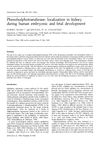 18 citations,
November 1994 in “Histochemical Journal”
18 citations,
November 1994 in “Histochemical Journal” The enzyme PST is found in developing human kidneys and helps with detoxification and development.
 176 citations,
January 2003 in “Journal of Investigative Dermatology”
176 citations,
January 2003 in “Journal of Investigative Dermatology” Bone Morphogenetic Proteins (BMPs) help control skin health, hair growth, and color, and could potentially be used to treat skin and hair disorders.
 89 citations,
November 2017 in “Journal of Cellular Physiology”
89 citations,
November 2017 in “Journal of Cellular Physiology” The Wnt/β-catenin pathway is important for tissue development and has potential in regenerative medicine, but requires more research for therapeutic use.
 48 citations,
June 2020 in “Current Rheumatology Reports”
48 citations,
June 2020 in “Current Rheumatology Reports” Different types of fibroblasts play various roles in both healthy and diseased tissues, and understanding them better could improve treatments for fibrotic diseases.
 24 citations,
May 2018 in “Journal of Molecular Endocrinology”
24 citations,
May 2018 in “Journal of Molecular Endocrinology” The spiny mouse is a unique menstruating rodent that can help us understand menstruation and reproductive disorders.
 21 citations,
June 2018 in “Current Opinion in Genetics & Development”
21 citations,
June 2018 in “Current Opinion in Genetics & Development” Scientists have made progress in growing mini-organs and regenerating parts of the skin, with plans to treat hair loss in a future trial.
 10 citations,
May 2019 in “International Journal of Environmental Research and Public Health”
10 citations,
May 2019 in “International Journal of Environmental Research and Public Health” Finasteride may cause kidney damage.
 8 citations,
March 2019 in “Open Biology”
8 citations,
March 2019 in “Open Biology” The document concludes that regenerating functional ectodermal organs like teeth and hair is promising for future therapies.
 7 citations,
January 2022 in “Animal Reproduction”
7 citations,
January 2022 in “Animal Reproduction” Using rodents for research shows that health problems in the womb can cause diseases later in life.
 4 citations,
February 2021 in “Nano select”
4 citations,
February 2021 in “Nano select” MSC-Exos can aid organ development and offer therapeutic benefits for various conditions.
 May 2017 in “American Society of Health-System Pharmacists eBooks” 12 citations,
April 2019 in “Nature protocols”
May 2017 in “American Society of Health-System Pharmacists eBooks” 12 citations,
April 2019 in “Nature protocols” Scientists created a functional 3D skin system from stem cells that can be transplanted into wounds.
 1 citations,
July 2021 in “Organoid (Online)”
1 citations,
July 2021 in “Organoid (Online)” Organoid technology is advancing and entering commercial use, with applications in disease modeling, drug development, and personalized medicine.
 December 2023 in “Aggregate”
December 2023 in “Aggregate” Scientists are using clumps of special stem cells to improve organ repair.
 May 2023 in “bioRxiv (Cold Spring Harbor Laboratory)”
May 2023 in “bioRxiv (Cold Spring Harbor Laboratory)” Cannabidivarin (CBDV) helps new brain cells grow and develop in a specific brain area through a certain receptor.
 32 citations,
May 2010 in “Pharmacopsychiatry”
32 citations,
May 2010 in “Pharmacopsychiatry” Finasteride reduces new brain cells in male mice, possibly causing depression.

Lhx2 is a crucial regulator of the Sonic Hedgehog signaling in early mouse retinal development.
 37 citations,
September 2018 in “Psychoneuroendocrinology”
37 citations,
September 2018 in “Psychoneuroendocrinology” Finasteride treatment in male rats causes long-lasting effects on depression-like behavior, brain cell growth, inflammation, and gut bacteria composition.
61 citations,
April 2018 in “Frontiers in endocrinology” Sex steroids produced in the hippocampus are crucial for brain functions like memory and learning in rodents.
 30 citations,
March 2017 in “ACS biomaterials science & engineering”
30 citations,
March 2017 in “ACS biomaterials science & engineering” Hair follicles are valuable for regenerative medicine and wound healing.
 22 citations,
December 2010 in “Journal of Cosmetic Dermatology”
22 citations,
December 2010 in “Journal of Cosmetic Dermatology” Finasteride may increase depression by reducing brain cell growth.
 August 2020 in “Current psychopharmacology”
August 2020 in “Current psychopharmacology” Pregnancy and nursing increase certain brain activities in rats, but these changes disappear when the babies are taken away.
Hair follicles supply a crucial brain development protein to the brain via platelets.
 4 citations,
August 2021 in “Biomedicine & Pharmacotherapy”
4 citations,
August 2021 in “Biomedicine & Pharmacotherapy” 5-alpha reductase inhibitors, like finasteride and dutasteride, may cause depression, but more research is needed to understand why.
 75 citations,
September 2017 in “Developmental biology”
75 citations,
September 2017 in “Developmental biology” The circadian clock influences the behavior and regeneration of stem cells in the body.

Skin stem cells in hair follicles are important for touch sensation.

Hair follicle stem cells are crucial for touch sensation and proper nerve structure in mice.
 2 citations,
January 2008 in “Elsevier eBooks”
2 citations,
January 2008 in “Elsevier eBooks” Humans have limited regenerative abilities, but new evidence shows the adult brain and heart can regenerate, and future treatments may improve this by mimicking stem cell environments.
 254 citations,
January 2012 in “Nature Reviews Molecular Cell Biology”
254 citations,
January 2012 in “Nature Reviews Molecular Cell Biology” Stem cell offspring help control their parent stem cells, affecting tissue health, healing, and cancer.
 85 citations,
October 2015 in “Proceedings of the National Academy of Sciences of the United States of America”
85 citations,
October 2015 in “Proceedings of the National Academy of Sciences of the United States of America” NF-κB is crucial for zebrafish heart repair, affecting heart cell growth and repair processes.



























